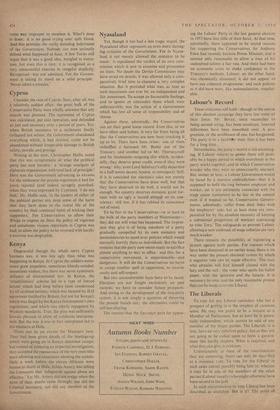The Liberals
To vote for any Liberal candidate who has prospect of getting in is the simplest of common sense. He may not prove to be a success as a Member of Parliament, but at least he is poten- tially independent, which cannot be said of any member of the major parties. The Liberals, it is true, have no very coherent policy; but as they are not going to be called upon to form a govern- ment this hardly matters. What is required, and what they can give, is criticism.
Unfortunately in most of the constituencies they are contesting. theirs can only be described as a nuisance vote. To vote for the Liberal in such cases cannot possibly bring him in; whereas it may let in one of the members of the other parties (Labour usually) who might otherwise have been second in the poll.
In such circumstances to vote Liberal has been described as anarchist. But is it? The point of such a vote is to register a protest against the present two-party system; there could hardly be a more effective way of bringing home to the two parties the system's tiresome defects. But it has more than this simple negative virtue. We can- regrettably—assume that the Liberal vote in this election is not going to be very great. It will be no great surprise, indeed, if it is even smaller propor- tionately than before. But it would be deplorable if the Liberal Party were to get so heavy a reverse that it collapsed altogether. A third force is urgently needed in British politics; and if the Liberal vote at this election does no more than indicate that there is a solid core of discontented electors who refuse to play the two-party game, it will have done enough.







































 Previous page
Previous page